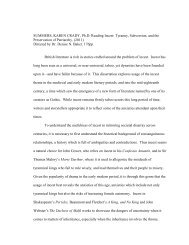THE DEVELOPMENT OF EXECUTIVE FUNCTION IN EARLY ...
THE DEVELOPMENT OF EXECUTIVE FUNCTION IN EARLY ...
THE DEVELOPMENT OF EXECUTIVE FUNCTION IN EARLY ...
Create successful ePaper yourself
Turn your PDF publications into a flip-book with our unique Google optimized e-Paper software.
Harnishfeger, K. K., & Bjorklund, D. E (1993). The ontogeny of inhibition mechanisms: A renewed approach<br />
to cognitive development. In M. L. Howe & R. Pasnak (Eds.), Emerging themes in cognitive development,<br />
Vol. 1. New York: Springer-Verlag.<br />
Hasher, L., & Zacks, R. T. (1984). Automatic processing of fundamental information: The case of frequency of<br />
occurrence. American Psychologist, 39, 1372-1388.<br />
Hasher, L., Zacks, R. T., Stoltzfus, E. R., Kane, M. J., et al. (1996). On the time course of negative priming:<br />
Another look. Psychonomic Bulletin & Review, 3, 231-237.<br />
Hauser, M. D. (1999). Perseveration, inhibition and the prefrontal cortex: a new look. Current Opinion in<br />
Neurobiology, 9, 214-222.<br />
Hommel, B. (2000). The prepared reflex: Automaticity and control in stimulus-response translation. In S.<br />
Monsell & J. Driver (Eds.), Attention and performance XVIII: Control of cognitive processes. Cambridge,<br />
MA: MIT Press.<br />
Houde, 0., & Guichart, E. (2001). Negative priming effect after inhibition of number/length interference in a<br />
Piaget-like task. Developmental Science, 4, 119-123.<br />
Houghton, G., & Tipper, S. P. (1994). A model of inhibitory mechanisms in selective attention. In D.<br />
Dagenbach & T. Carr (Eds.), Inhibitory processes in attention, memory, and language. Orlando, FL: Academic<br />
Press.<br />
House, B. (1989). Some current issues in children's selective attention. Advances in Child Development and<br />
Behavior, 21, 91-119.<br />
Hughes, C. (1998a). Finding your marbles: Does preschoolers' strategic behavior predict later understanding of<br />
mind? Developmental Psychology, 34, 1326-1339.<br />
Hughes, C. (1998b). Executive function in preschoolers: Links with theory of mind and verbal ability. British<br />
Journal of Developmental Psychology, 16, 233-253.<br />
Huttenlocher, P. R. (1979). Synaptic density in human frontal cortex: Developmental changes and effects of<br />
aging. Brain Research, 163, 195-205.<br />
Huttenlocher, P. R. (2002). Neural plasticity: The effect of environment on the development of cerebral<br />
cortex. Cambridge, MA: Harvard University Press.<br />
Hutton, U. M., & Towse, J. N. (2001). Short-term memory and working memory as indices of<br />
children's cognitive skills. Memory, 9, 383-394.<br />
Inhelder, B., & Piaget, J. (1964). The early growth of logic in the child: Classification and seriation. (E. A.<br />
Lunzer & D. Papert, Trans.). New York: Harper & Row.<br />
Jacobson, C. E (1936). Studies of cerebral functions in primates: I. The functions of the frontal association<br />
areas in monkeys. Comparative Psychology Monographs, 13, 1-30.<br />
Jacques, S. (1995). The development of rule use during the preschool period. Unpublished Master's thesis,<br />
University of Toronto.<br />
Jacques, S., & Zelazo, P. D. (2001). The Flexible Item Selection Task (FIST): A measure of executive function<br />
in preschoolers. Developmental Neuropsychology, 20, 573-591.<br />
Jacques, S., & Zelazo, P. D. (in press). Language and the development of cognitive flexibility: Implications<br />
for theory of mind. In J. W. Astington & J. A. Baird (Eds.), Why language matters for theory of mind. Oxford:<br />
Oxford University Press.<br />
Jacques, S., Zelazo, P. D., Kirkham, N. Z., & Semcesen, T. K. (1999). Rule selection versus rule execution in<br />
preschoolers: An error-detection approach. Developmental Psychology, 35, 770-780.<br />
Kamawar, D., & Olson, D. R. (2000). Children's representational theory of language: The problem of opaque<br />
contexts. Cognitive Development, 14, 531-548.<br />
Karmiloff-Smith, A. (1992). Beyond modularity. Cambridge, MA: MIT Press.<br />
Kemler, D. G. (1978). Patterns of hypothesis testing in children's discriminative learning: A study of<br />
the development of problem solving strategies. Developmental Psychology, 14, 653-673.<br />
Kendler, H. H., & Kendler, T. S. (1962). Vertical and horizontal processes in problem solving. Psychological<br />
Review, 69, 1-16.<br />
Kendler, T. S. (1979). The development of discrimination learning: A levels-of-function explanation. Advances<br />
in Child Development and Behavior, 13, 83-117.
















